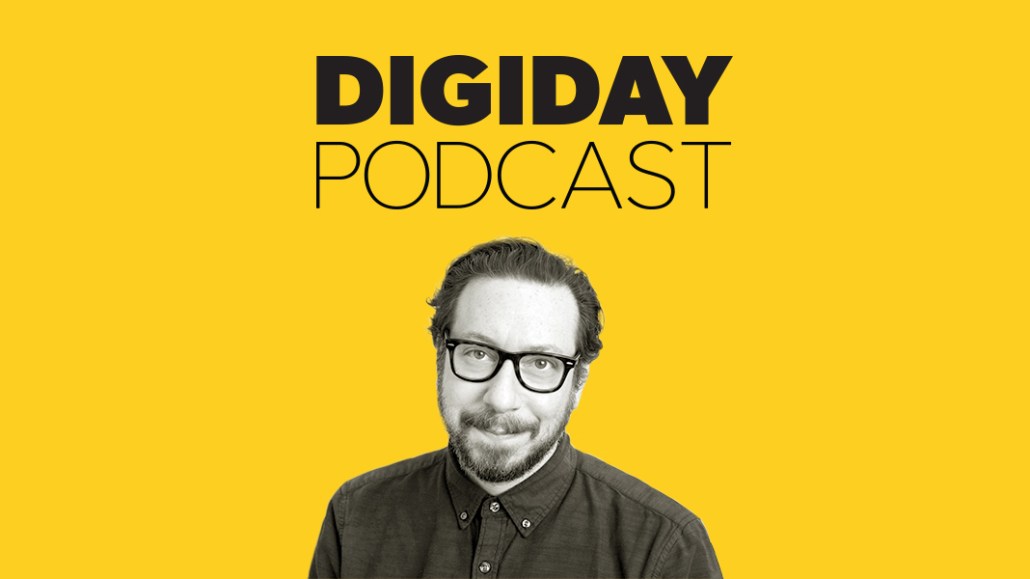Secure your place at the Digiday Media Buying Summit in Nashville, March 2-4
Josh Topolsky on why Bustle Digital Group and The Outline make strange (but good) bedfellows

Subscribe: iTunes | Spotify | Google Play | Stitcher | Anchor
Bustle Digital Group might not seem like a natural home for The Outline, the website once described as “a New Yorker for millennials.” And that’s the point, said Josh Topolsky, founder of The Outline. After its acquisition by Bustle, he now serves as the parent company’s editor-in-chief of culture and innovation, overseeing The Outline, Mic and Inverse.
“The opposites thing is actually part of the attraction and why it makes sense,” said Topolsky. “We had this conversation about should media businesses exist where everything isn’t trying to get to 40 million uniques. Let’s figure out what those different brands are and build them to the right size, and find the right brands that want to advertise on them, find the right audiences that want to come and visit them. And the collection of those things makes the overall business stronger.”
This week on the Digiday Podcast, Topolsky discussed Bustle Digital Group’s newly launched tech news site, Input; his previous declaration on the Digiday Podcast that “everything about digital media is insanely boring” and how history is repeating itself as publishers rely heavily on traffic from Google’s open source Accelerated Mobile Pages.
Here are a few highlights from the conversation that have been lightly edited for clarity.
His chat with Bustle CEO Bryan Goldberg why Bustle Digital Group was the right fit for The Outline
“We had this conversation about should media businesses exist where everything isn’t trying to get to 40 million uniques and trying to be the monolithic piece? I think a place where we really connected was [on] let’s figure out what those different brands are and build them to the right size – and find the right brands that want to advertise on them, find the right audiences that want to come and visit them. And the collection of those things makes the overall business stronger.
“That was the thing that was most surprising when I first talked to [Goldberg]. Even though our strategies for building businesses were totally different, our alignment [came with] this idea that businesses shouldn’t be one size fits all and that there’s room in a healthy business for smaller sites like The Outline and really big sites like Bustle and everything in between if you run the business right.”
Tech coverage went mainstream so it’s time for an evolution
“When I was starting The Outline, I felt like I had gotten bored with what technology coverage was doing. The things that we used to think were specialized and for a small segment of the audience have become mainstream. And the mainstreaming of that has made those stories way less interesting even though people still cover them over and over again. In addition, [a publication like] The New York Times is covering technology as good if not better than almost anybody else [about topics like] Nazis on Twitter or what’s happening on Instagram.”
Publishers should confront tech platform owners not depend upon them
“When people talk about the duopoly of Facebook and Google, they need to address that the duopoly has its basis not just in their size but in their ability to manipulate the technology that we use to tell our stories. And when you can manipulate it and force publishers into something, it becomes very easy for you to tell them what to do and how to do it. The way we play the SEO game in the industry is a direct result of Google making decisions about content. There’s a price that’s exacted, and we have to push back against it.
“And one of the ways we push back is by owning our platforms and owning the way we tell stories as much as humanly possible, even if it means that we’re still going to use AMP and Apple News and recognize that they will bring traffic and audience. We have to think about them, but we need to have somewhere that’s home base, where we can express the right story in the right way.”
More in Media

WTF is a creator capital market?
What is a creator capital market, what does it mean for creators looking to diversify revenue, and why is it so closely tied to crypto?

Media Briefing: Publishers explore selling AI visibility know-how to brands
Publishers are seeing an opportunity to sell their AI citation playbooks as a product to brand clients, to monetize their GEO insights.

Creators eye Snapchat as a reliable income alternative to TikTok and YouTube
Figuring out the Snapchat formula has been very lucrative for creators looking for more consistent revenue on a less-saturated platform.





